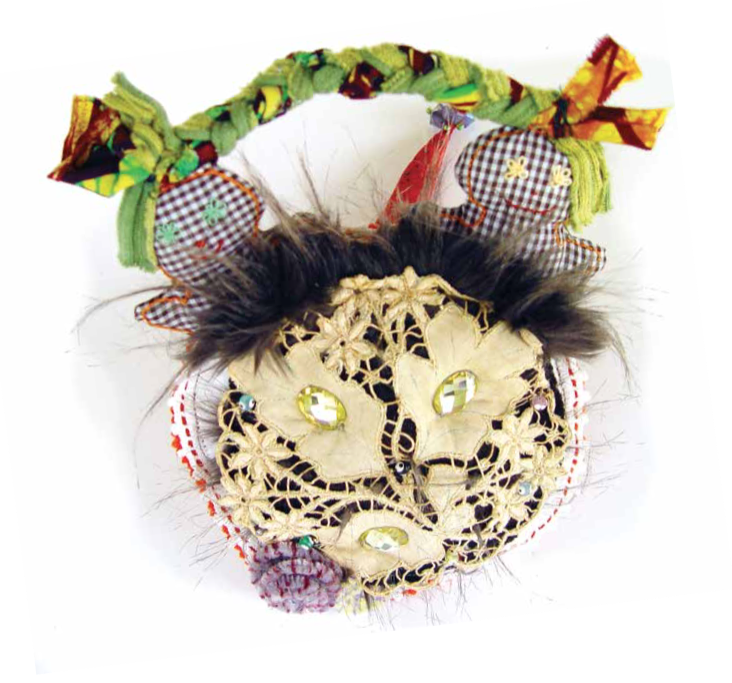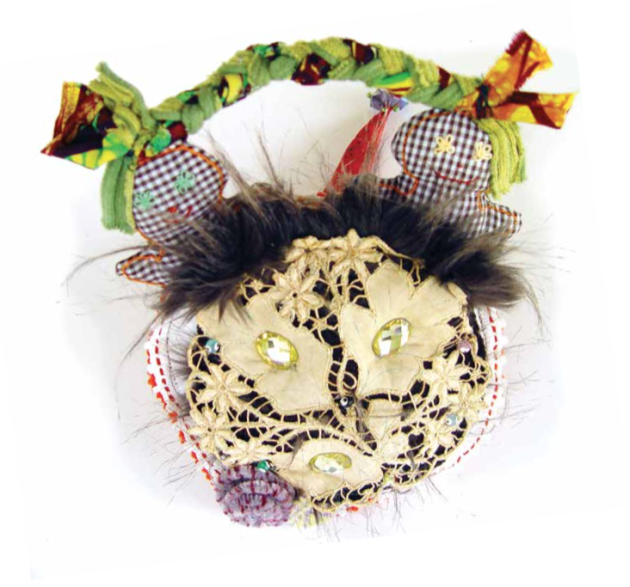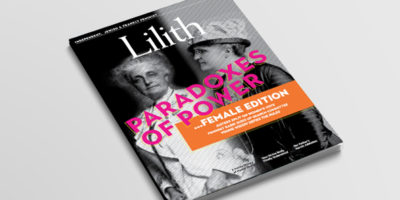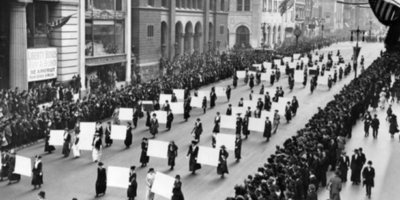
The Search Committee

Art by Daria Dorosh, “Doily Face.”
As I stood waiting at the side door with Rabbi Niederstein, I took in the first facts of the building. Maybe, I dared hope, my building. The synagogue fit between its neighbors like a molar. A modest plaque, near the rusted doorbell, commemorated the founding: Congregation B’nei Yisroel, 1909. I’d just noticed the pile of stray trash by the main entrance when a wisp of a man in an ancient gray suit let us in. Max Blumberg, the president. A yarmulke leaned precariously on his knobby forehead.
“A young lady!” Mr. Blumberg marveled.
Surely, they knew. Surely, they’d seen my resume.
Niederstein stamped the snow off his galoshes. “Rabbi Whitman,” he announced, urging me forward. “Elyse Whitman. This week’s candidate.”
President Blumberg studied me as he straightened his yarmulke. “A ziesse maidel.” He made a little bow. “And you are a rabbi.”
I shook the president’s extended hand. Should I have corrected Niederstein? Strictly speaking, I wasn’t “Rabbi” yet, not until graduation in May. Hiring season begins in the slush, in January.
The rest of the committee was already in place around a splendid oak table, and Max made further introductions. Aaron Resnick—the shamash, the man who looked after the building. Miss Garfunkel—Bertha, granddaughter of the founder. Mrs. Garfunkel—Rose, Bertha’s widowed sister-in-law.
An electric heater buzzed in the corner. The committee members were keeping their coats on. Max looked at me.
“I’m not cold,” I lied, shrugging back my parka so the navy suit would show. “I’m fine.”
Niederstein had to work hard to get things going, even though they’d all sat in this room the week before, interviewing a parallel candidate. I knew about him: Jonathan Hirsh-Cohen, my classmate, a pompous lightweight, reliably positioned in the academic penumbra between pass and fail. A male.
Max sat stiffly. Rose Garfunkel kept her eyes cast down. While Aaron tiptoed over to check on the heater, Niederstein acknowledged that B’nei Yisroel had every right to be suspicious. A rabbi for free? Niederstein reminded them that he was Director of the Federation’s Urban Synagogue Renewal Project and its salary grant. Its mission was to preserve historic Boston congregations like theirs whose members had, in his tactful words, “moved away.” Congregation B’nei Yisroel was smack in the middle of South Bay, a nascent redevelopment boom on all sides. There would be an influx of young families. The Federation had allocated funding to bring graduates from the smaller rabbinical schools to congregations like B’nei Yisroel, get them active again. “Just wait until you hear her sing,” Niederstein concluded.
“We are a traditional, Conservative synagogue,” Bertha reminded him.
“Baruch Hashem, it’s 1990,” Niederstein replied. “A woman on the pulpit is thoroughly sanctioned now, not only by the Reform movement but by all the Conservative bodies at the national level—United Synagogue, the Seminary, and the Rabbinical Assembly.”
In the brittle silence, I couldn’t tell if they were uncomprehending, hostile, or just numb with cold. Niederstein’s delivery of my qualifications had been—appropriately, I had to admit—absent of rhetorical color.
“So with this new rabbi we could join up as a Conservative shul again?” President Blumberg sounded wistful, even eager.
“That is not a simple question,” Niederstein said. “But right now, you concentrate on getting your rabbi. A woman is fine. And,” he thought to add, “since B’nei Yisroel no longer belongs to the Conservative movement, you have no restriction in your hiring. You have an advantage there.”
Niederstein had filled me in. Their original, Orthodox-style shul with its women’s balcony had eased into Conservative in 1932: mixed seating, a blind eye to driving on the Sabbath. Later, in harder times, it free-fell to “Traditional.” That boiled down to “just like Conservative, but unaffiliated.” A common pattern. No national dues, no burdensome rules or policies.
How about the singing?” asked Bertha Garfunkel. “I’ve been to bar mitzvahs at the Reform. We do not care for folk songs, the guitar, what several young rabbis are doing.”
I shared Bertha’s taste in synagogue music, but just then it would have sounded self-serving to say so.
“Rabbi Whitman is highly musical,” Niederstein said in rescue. “Rest assured. You can count on many of the younger rabbis to sing the traditional service.”
In the awkward silence, I pictured how this scenario had gone with Jonathan in the hot seat. “Rabbi Hirsh-Cohen is familiar with the Conservative service from early childhood,” Niederstein would be saying as they all beamed at the candidate. “This young man was elected president of his regional synagogue youth group for two terms. And, of course,” Niederstein wouldn’t pass up adding, “as a Cohen, he comes from an ancient, holy lineage.” Why had Niederstein even brought me? He seemed to be doing his best on my behalf, but I suspected that he himself anticipated less trouble down the road with Rabbi Hirsh-Cohen manning the pulpit here. I began to wonder how it might go if I got the offer.
Bravely, President Blumberg smiled and broke through the chilly fog threatening to asphyxiate the proceedings. “It is my dream to have a Hebrew school again, for my twin great-grandsons.”
This was my chance. I said that my Sarah was almost seven, and a school was one of my top priorities. I would find the necessary families.
Indeed, Sarah would have to attend Hebrew school. And show interest and proficiency, if not mastery and zeal. Sarah was to be the sacrificial child of clergy. I would also need her bright little face on the bimah with me, at least until the end of her “cute” years. And she could never, ever misbehave.
Niederstein jumped in again. “Only new energy can preserve a shul like B’nei Yisroel,” he said, “and that’s why this grant is available. Keep in mind that a female rabbi can be a great asset in attracting younger people.”
Maybe Niederstein was expecting that Jonathan would get more glamorous offers. “Your neighborhood is about to change,” he explained. “Condominiums are here, brownstone restorations. Jews are moving back,” he repeated.
“Are there any questions?” He sounded enthusiastic. Maybe he really was on my side.
Blumberg and friends were trying valiantly to face facts, but it was hard to admit they were pushed outside their familiar denomination for a spiritual leader. “Not Conservative? Not from the Seminary?”
“No, the Seminary wasn’t accepting women candidates when Rabbi Whitman began her training.”
More or less true. Way back when I started to prepare, I was slated for many semesters of “Basic Studies,” not for credit. By the time I was ready, women were allowed, technically speaking, to apply to the Jewish Theological Seminary. I knew I wouldn’t get in.
I wondered what excuse Niederstein had given for Hirsh-Cohen’s pathway to the pulpit. The Academic Institute for Rabbinical Training, the alma mater Jonathan and I would soon look upon together with nostalgia, was an inclusive place. Smart and fervent young women could join so-so young men to prepare for the rabbinate. Niederstein must have made clear to B’nei Yisroel that a genuine Jewish Theological Seminary graduate of any gender would cost the Federation double, but facts have an uphill battle against desire.
“—Well, we can discuss it,” Max said, nodding. “Just so she davens and will carry on the tradition.”
Precisely what I yearned to do. Max seemed to like me. The room was warming up. Steam clanked in the radiator. I slid off my parka, and even Niederstein removed his overcoat and fedora; the hour was far from over.
Meanwhile, I glanced around the old rabbi’s study. What a collection! Talmud—the Vilna Shas! Maimonides! Responsa! A huge desk, a big, vacant swivel chair.
For the interview, Rose Garfunkel had plugged in the electric kettle and put out a package of Stella D’Oro cookies. For Shabbos kiddush the men took turns bringing herring and schnapps, I was told. Rose ran the electric broom once a month, on a Monday, in the basement, where they held the service.
I spoke up. “I’ll start an adult education program, too. Torah study, Jewish history and philosophy. Traditional learning and also contemporary perspectives that will attract new people, even those who have never been interested in joining a synagogue.”
No one responded.
“But, of course, the membership would be very involved in deciding on a program. I believe that a synagogue should be highly participatory.”
You could hear a paper clip drop. The B’nei Yisroel members in the room turned their eyes to Rabbi Niederstein.
Had I misspoken? What could be wrong with member participation? Maybe I should have let Debra do that practice interview with me. Debra Rothberg, in the class ahead; the first woman to graduate.
It was Bertha who changed the subject. “And what brought you to the rabbinate, young lady?” There was provocation in Bertha’s question, something to watch out for, but I needed no preparation for this one.
“The Jewish heritage,” I answered. “I love the Jewish heritage, and I want to have a part in perpetuating it.”
I wanted to pour out the story of my devotion, but Debra, she with the five out of five job offers, had counseled me not to mention Daniel Deronda. So what if I’d had a kind of conversion experience? To advertise the thunder-clap effect of a novel by George Eliot, Debra had drummed into me, would raise the wrong questions: George Eliot? George, a woman? A Victorian novel? Was the rabbi a failed academic? (You might say so.) An Anglophile? (Those anti-Semites?) Daniel Deronda indeed. How could I identify with a made-up British lord who didn’t know he had Jewish genes? Even one who went on to lead a proto-Zionist sally to the Promised Land. No, I was to keep in mind the fact that Moses himself didn’t talk about the burning bush.
Nor was I to mention that I’d grown up in a Jewish vacuum, a household so secular it bordered on assimilated. I was not to wax poetic about the Jewish soul that may lie concealed, dormant, not even able to name itself. Yet this was the soul I knew. And when the bush ignites or the trumpet sounds or the book opens—even for a disaffected graduate student in analytic philosophy—there it is, a Jewish soul fully formed and ready to burst into flower.
Clearly, Bertha was the sticky turnstile into the rabbinic study. “Love,” I said, concluding my statement. “I love Judaism. And I would love to have a part in restoring B’nei Yisroel to its former size and importance.”
“But wouldn’t you have more opportunity, dear, in a congregation of young people?”
Bertha was sharp, but I was prepared for this one, too. “The suburban congregations can manage.” Bertha’s eyes were boring into me. I wondered how Rabbi Jonathan had answered that question. “I want to help a congregation like B’nei Yisroel have a future. I’m concerned with the future.”
I left out the part about taking care of old people. And extinction—I left out the threat of extinction that hung over them, over 100 years of Jewish life downtown. I knew as well as Bertha did that it wouldn’t be easy. I’d have to find the young people to fill those pews. I could count on nothing beyond my initial, modest Federation salary and the grant money for repairs.
I’d had other job possibilities. Chaplain for the Federation’s homes for the aged, rabbinic advisor for the early childhood centers. Worthy positions, providing needed services and sufficient challenges. And well suited to the ministering female touch. But when Niederstein mentioned Congregation B’nei Yisroel—a throwaway as he handed me the Federation’s postings, I knew. Needy and old, B’nei Yisroel called for rescue. I saw myself on the pulpit of a proud old building. I saw myself lifting my arms in a great arc of blessing, as light beamed into the sanctuary through the dome above.
Bertha’s ramrod posture softened, and I, too, let myself relax. I dared picture myself in the big swivel chair.
“Your husband must be proud to have a rabbi for a wife, Rabbi,” Max, the president, was saying.
It bothered me to reflect that the committee probably hadn’t investigated how the Hirsh-Cohen family regarded Jonathan’s life’s work, but I could report that my husband, Len, was extremely supportive, eager to take on a role in the synagogue.
I pictured how, together, we could get that whole contingent moving—maybe revive the Sunday morning men’s group, Yiddish conversation. And there were still, surely, elderly women in the neighborhood, women who’d relish some activity in their old milieu. A cooking and baking club. Why not? I could see Rose already, in her apron, braiding dough.
But Bertha wasn’t through. Bertha, without doubt, regarded herself as the brains behind the management. She was the management. With her pink curls, and blue eyes that could still skewer you, she wasn’t about to let this young lady into the sanctuary just yet.
“So,” Bertha said, “B’nei Yisroel is a respected congregation, founded over 90 years ago by my grandfather, of blessed memory. I read here that Rabbi Whitman,” she tapped the resume, “has completed the standard courses in Bible, law, and liturgy, as well as congregational management and counseling, but I do not see evidence of a great deal of Talmud study or medieval philosophy.” Bertha reminded her committee that my resume listed six non-credit courses in remedial Hebrew, and that the Academic Institute for Rabbinical Training was not a yeshiva. All very nice that I did so much work at the university, but could I explain how it was I felt qualified to step into the shoes of Rabbi Velvel Kalish. I sensed that this was all longhand for “the candidate does not have a long gray beard.” Even in the navy suit, I knew I didn’t look the part.
Nothing like the pageant of professional forbears whose portraits lined the wall. Their beards spanned decades, generations. The series ended just above Bertha’s head, with a dim image, eyes obscured behind thick glasses: Rabbi Kalish. Beyond, wall space remained, where I dared almost imagine, fleetingly, my own likeness installed, in the fullness of years.
Niederstein jumped in. “Our candidate has a solid, well-rounded background. She will undoubtedly grow in her role, as do all our young rabbis today. Remember that outside strictly Orthodox circles very few study from childhood the way Rabbi Kalish did in the old country.” Then he added a point that would give Bertha pause. “I know you’re not looking for someone of Orthodox practice, Miss Garfunkel. There would have to be separate seating, and someone like yourself very possibly could not serve on the Board, and—and, naturally, you couldn’t use the electric heater on the Sabbath.”
Bertha glared. Who was Shmuel Niederstein to instruct her about Orthodoxy? She who had sat at the knee of its founder when B’nei Yisroel was barely more than a shtiebl?
“Rabbi Whitman brings the strengths of an advanced secular education,” Niederstein rattled on. “She is prepared to do everything a congregation needs. Bear in mind, the new women rabbis are doing very well.” Niederstein kept emphasizing the point. He was sweating. The room had really warmed up now.
Bertha was barely listening anyway. Her head tilted while she stared at me. Sizing me up. Was the candidate shomer shabbos? Did she condone dating outside the faith? Then there were the larger questions: Would a shul with this rabbi truly be accepted back into the Conservative movement? Would this female carry the great name of the congregation with sufficient weight?
Even as I basked in Niederstein’s recommendation, I knew that Bertha would have to call a huddle. A Co-hen had also been interviewed, a “priestly” candidate. The dignity of the congregation was at stake. Oh, who would bring the present inquiry to a close?
“Rabbi,” I heard Aaron asking me, in answer to my little prayer, “did you know the deli at Pullman Square? That was Resnick’s, my father’s business.” Aaron, figuratively speaking, held me by the lapel to recite the sandwich menu at Resnick’s: the Uncle Sam, which was plain tongue, and the Aunt Gert— Sam with onion on it. So, the tiptoeing Aaron Resnick had another side to him. How would he and Len get along, I wondered. Len had sworn that he was one hundred percent behind the role of rebbitz, as he jokingly called the husband of the rabbi. I didn’t know Resnick’s, but I did remember delis like that— the waft of garlic from the pastrami, the deep barrels brimming with wet pickles. Even Bertha had paused her administrative operations to go a little dreamy over Resnick’s Deli.
They were all old, and Bertha would be a challenge, but they had spirit—and Yiddishkeit. Then Bertha kicked a little frown toward Max even as she nodded closure.
“We’ll have a meeting later this week,” Max said, glancing back at her, “and we’ll let Rabbi Niederstein know our decision.” While Bertha glowered, Max stood, thanked everyone for coming, and held out his hand again to shake mine.
I prayed silently. Please, yes.
Naomi Myrvaagnes writes prose and poetry as a Resident Scholar at the Brandeis University Women’s Studies Research Center. “The Search Committee” is an excerpt from her novel in progress, The Rabbi and Her Children.



